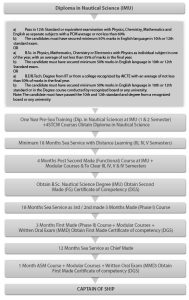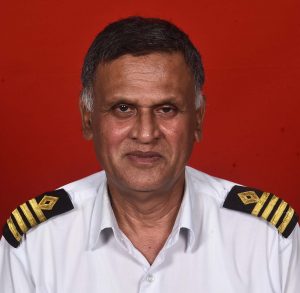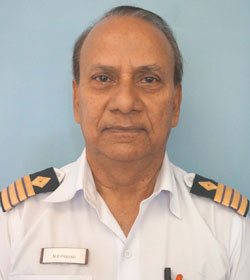TRAINING SHIP RAHAMAN
IMU DIPLOMA IN NAUTICAL SCIENCE
PRE-SEA COURSES
- The Standing Rules and regulations of the Academy shall be binding on all students. This may be changed without prior intimation to the students.
- Gold ornaments or other valuable items or any kind of electrical apparatus are not allowed to be kept.
- Cadets are not allowed to keep more than about Rs. 500/- in cash with them. Excess cash should be deposited with the cashier and can be withdrawn in lots of Rs. 500/-.
- Uniform is to be worn at all times during training. Hence, very few civilian clothes are to be brought. In case any student found not in the proper uniform, he has to Penalize for the day.
- Cadets are permitted ‘shore leave’ in uniform only on Sundays between 07.00 and 20.00 hours.
- Cadets are not allowed to stay out of the campus at night under any circumstances. Parents are instructed not to make any request for the same.
- Visitors are permitted only on Sundays between 09.00 and 18.00 hours.
- The use of tobacco and alcohol is strictly prohibited in the Academy. If the candidate is found in alcoholic condition or under drug effect, this would cause immediate rustication from the Academy. The Academy’s decision in this case will be final. No appeal against the decision will entertained from parents or guardians.
- Long hair, moustaches and beards are not allowed during the period of training. Sikh candidates are exempted from this.
- The following are prohibited in the hostel
- Illegal drugs
- Gambling
- Fire arms of any kind
- Knives
- Pets or livesock of any description
- Special area has been earmarked for Cadets to meet their guests. Guests wishing to meet the cadets are to approach the course instructor / Course Officer (during off work hours). The cadets will be informed, whilst the guest wait in the guest waiting area. Under no circumstances the guest are to proceed to the hostel rooms / class rooms.
- In case if the student withdrawing from the course in between the Completion period of the course, he has to pay entire amount of the concern course fees. (Either withdrawing himself or rusticated due to major offence).
- In case of damage or loss of hostel property the cost will be recovered from the students if identified It will be individual otherwise all the student of the hostel room (Individual area) decided by the associate warden.
- The use of electrical appliances such as immersion heaters, electric stove/ heaters / electric iron are forbidden in any of the rooms allotted for residence. Private cooking in the hostels / student’s room is strictly forbidden. Such appliances, if found will be confiscated and a fine will also be imposed.
- When the students go out of their room they should switch off all the electrical / electronic appliances, and keep it locked (at all times). Violation will attract suitable penalty and punishment as decided by authorities.
- Not attending classroom lectures without permission will result in Violation will attract suitable penalty and punishment as decided by authorities.
- In case the applicant withdraw from the course before commencement of the course or does not report on the day of commencement of course. I or we shall not ask for any refund or transfer of any fees.
- The college is not responsible if any student/parents paying any money to any agent for admission or placement.
- All payments must be made in college, at the college counter only and receipts to be obtained for all payments.
- Disputes are subject to Mumbai jurisdiction.
- Fees: Rs. 3,60,000/-
- Indian National
- 10+2/ equivalent (PCM 60%) OR B.Sc (PCM) / B.Sc (Electronics with Physics as individual subject in one of the years) with marks not less than 55% in final year OR B.E./B.Tech from IIT or college recognized by AICTE with marks not less than 50%.
- Note: English Marks are to be 50% or more in any one of the above examination.
- Age: Not more than 25 years on the date of commencement of training.
- Eye sight: distance vision 6/6 in better eye and 6/9 in other eye and normal colour vision shall be testedby Ishihara test chart.
- Medical Fitness Certificate from a Doctor Approved by DGS (Original + one photocopy)
- 18 copies of passport size and 4 stamp size Photographs with White Shirt & Light Background.
- Ships that carry goods, people or render services of a non-military nature constitute the merchant navy.
Merchant Navy touches every body’s life in one way or other. Material for building a house may have been brought by a bulk carrier, the fuel used in your vehicle was brought by a tanker and fruits in the market from different countries were brought in a refrigerated container carried on a ship
Merchant Navy is a very lucrative career, some of the many attractions of this profession are listed below:-
- High income (Tax Free)
- Independence and responsibility at a young age
- Quick promotions
- No expenses whilst on board (High class accommodation and cuisine)
- Travel around the globe and experience the world
- Adventure – No two days on the ship are the same
- Long Vacations - Time to pursue your hobbies
- Future opportunities to pursue a career ashore
- If you are an adventurous person who likes to be outdoors and is not interested in a monotonous 9-5 job, then Merchant Navy is the best career option for you.
- A student who passes his/her 10 + 2 exams and takes up any stream for further studies spends at least another 4 years in college before becoming eligible for a job in the particular stream. Whereas a candidate who joins Merchant Navy, has to undergo only 1 year of training at an approved institute and then starts earning whilst doing the onboard training. Moreover the stipend received during the training period itself is higher than the starting salaries in many career streams ashore.
- At the age of 21 when a normal student graduates from any stream and starts looking for a job, the candidate who has joined Merchant Navy has already completed his/her training and starts working as an officer on board the ship and earns wages to the tune of more than 1 Lakh rupees per month.
- There are various types of ships but the main job of a ship is to transport goods or people from one place to another. Ships are responsible for transporting 96% of goods around the world and is the most important service helping to keep the wheels of the global economy moving smoothly. Shipping is a vital link in world trade and today it is one of the booming sectors of the industry. If you join the merchant navy you could choose to be a navigating officer (also known as a deck officer) or an engineering officer.
Educational Qualification:
- For 10+2 Science students: from a recognized Board/University with Physics, Chemistry and Mathematics (PCM), with not less than 60% marks in PCM aggregate and 50% in English.
OR
- For BSc students :B.Sc in Physics, Mathematics, Chemistry or Electronics with Physics as individual subject in one of the year, with an average of not less than 60% marks in the final year, from a recognized University provided that the candidate must have passed 10+2 examination with Physics, Chemistry and Mathematics (PCM) from a recognized Board.
- STUDENT AWAITING RESULT CAN ALSO APPLY.
- English: Should have passed with not less than 50% marks in English as a separate subject, at either 10th or 12th standard or in the Degree programme conducted by a recognized Board/University.
- Age Limit: Minimum age should be 17 years and maximum should not exceed 25 Yrs at the commencement of course (Course commences on 1st Monday in February and August every year)
- Physical and Medical Standards: Medically fit as per the standards set by Merchant Shipping Medical Examination Rules and eyesight 6/6 in each eye without visual aid.
- The Deck Cadet Training programme leads to a diploma and thereafter a BSc degree in Nautical Science on successful completion of the full Cadet Training programme.
- After completion of the 1st and 2nd semester in the Pre-sea institute (total 1 year) the candidate is awarded an advanced Diploma in Nautical Science (DNS). He/she then has to complete the remaining 3 semesters (3, 4 & 5) as onboard training. During the onboard training the candidate is given the training material for the Distance Learning Programme, which is to be completed and submitted to the Pre-sea Institute at the completion of each semester.
- After the successful completion of all the 3 semesters the candidate has to attend 4 months of college for preparing for their 2nd Mates exams. On clearing the written and oral exams the candidate obtains a certificate of competency and is also awarded a BSc degree in Nautical Science by IMU. For more information visit http://www.imu.tn.nic.in
- Since the course itself leads to graduation, it would be best to pursue the course immediately after the 12th standard which would give the candidates a head start over the students joining after their graduation.
If you are an adventurous person who likes to be outdoors and is not interested in a monotonous 9-5 job, then Merchant Navy is the best career option for you.
Joining Merchant Navy as a deck cadet can be done in the following ways:
Method 1:
- Apply to Training Ship Rahaman for the post of Deck Cadet.
- The company will invite the applicant for a selection test provided the applicant fulfils all the qualification criteria set by DG Shipping and the Company as mentioned above.
- Applicant undergoes company selection test which includes a written test, a Psychometric evaluation, Interview and Medical Test.
- If applicant is successful in clearing the selection test then he is told to appear the IMU entrance test
- On successful passing of the IMU entrance test the applicant is advised to undergo a 1 year pre-sea course at an institute of the company’s choice.
Method 2:
- Applicant appears for IMU entrance test.
- Applicant passes the IMU entrance test.
- Applicant is counselled and he is allocated a Pre-Sea College anywhere in India.
- Applicant waits for companies to conduct campus recruitment or applies to companies on completion of the course.
- The 1st method is preferred as you are employed by a company before having done the course, and you also have an assurance of a sea berth for completing your training. This is not the case with the 2nd method where you have to look for a job on completion of the course.
- In the 1st method you are classified as a sponsored cadet
- The term sponsored candidate is used for as a candidate who will be sponsored of berth on completion of training and not sponsorship of tuition fees.
- A candidate who has met all the qualifying criteria; will be sponsored for a sea berth by Training Ship Rahaman.
- Candidates who are in the course of the selection process will declare themselves as a non-sponsored candidate in the Form A of the IMU entrance exam. These candidates can later declare themselves as a sponsored candidate if they are selected.
- As per stipulations from D.G. Shipping every candidate desirous of joining as an officer or an engineer on ships has to undergo one year of pre-sea training ashore. Pre-sea training can be undertaken in any one of the approved pre-sea training institutes across India.
- Cost of pre-sea training is approximately Rs.2.5 to Rs.3.0 lakh and has to be borne by the candidate.
- You must remember that Pre-Sea training is not subsidized by the government, there are various requirements that have to be considered in order to conduct pre-sea training and the cost of carrying these out is very high and has to be borne by the institute.
- Yes, once you have been selected by us we can arrange for banks to give you education loans at existing market rates, you could also approach a bank individually to obtain educational loans at favorable interest rates.
- The IMU or Indian Maritime University was formed by an Act of Parliament; the headquarters of the University is at Chennai with its campuses at Mumbai, Kolkata Chennai and Vishakhapatnam. Information about IMU can be obtained from their website www.imu.edu.in
- After you have fulfilled and completed all the selection formalities i.e. Fulfilling Company and Directorate of Shipping requirements, you will be directed to undergo a 1-year pre-sea training at a Maritime Institute of our choice. You will be informed about the institute in due course of time. The 1-year pre-sea course is a residential course i.e. you will be residing in hostel inside the campus.
- In the 1 year pre-sea course, you will be imparted training in shipping related fields and on general related topics. It is imperative that you pass both the semesters in order to satisfy requirements for going on board ships.
- After completion of the 1 year pre-sea training successfully, all your travel document requirements have to be in order before you can be placed on board ship. For this reason you must apply for your passport immediately on selection as a deck cadet or at least have your passport ready with you before completion of the 1st Semester.
- Once your travel documents are ready, you will proceed for your onboard training. The onboard training period is for 18months, during this time the company will be paying you a stipend of USD 400/- per month during your stay on board ship.
- Once you complete the onboard training period of 18months you will have to appear for promotional exams conducted by the Government of India, once you qualify in this test you are eligible to become an officer of a ship.
- For Career progression refer to the brochure attached, you can also visit our website www.maritimetraining.in
- So to recap in order to become an officer onboard a ship you must undergo a 12 month shore based training in a Maritime college, followed by 18 months training onboard ships.
- Both these training has to be completed for a trainee to qualify to appear an examination as an officer.
- Kindly logon to the following link to check the list of boards which are not recognized by IMU - http://www.ima-maritime.com/fake.htm
- We believe that a trainee must get an all-round experience on various types of ships and therefore broken up the 18 months in 3 intervals of 6 months each, after completing 6 months onboard one type of a ship the trainee is sent back home for a short vacation before sending him back on another ship for 6 months.
- Yes, you are right. Trainees who train in the deck department to become Navigating officers are called “deck cadet”, similarly trainee in the Engineering department is called a “Junior Engineer”.
- On completion of training the candidate is awarded a BSc in Nautical Science from affiliated university and also 2nd Mates Certificate of Competency from the Govt. of India, Ministry of Shipping which qualifies him/her to sail as an officer on board ships.
The following are some of the duties and responsibilities of deck officers on board the ship:-
- Navigate the ship from the bridge in watches (shifts) while at sea
- Ensure safety regulations are observed
- Co-ordinate cargo loading and discharge operations
- supervise the maintenance and upkeep of the ship
- Co-ordinate and supervise the activities of the crew
- Follow instructions from the captain with regards to ship operations
- Maintain accurate and up-to-date records of all activities
- There are plenty of jobs available for Captains and Chief engineers ashore in marine related or engineering related fields.
Choosing the right Shipping company is the key: Join a company which provides you
- a career path and
- has a structured training programme
- has a good safety and quality record
- has a sizeable fleet of ships to be able to provide continuous employment and varied experience
- Check out the companies past track record. Stipend remuneration should be your least priority, if you are a well trained officer the money will follow. The period that you spend on board as a cadet is the time for learning, what knowledge and experience you gain during this period will stand you in good stead as an officer in the later years. The company that provides extensive training is the one you should be looking for.


































